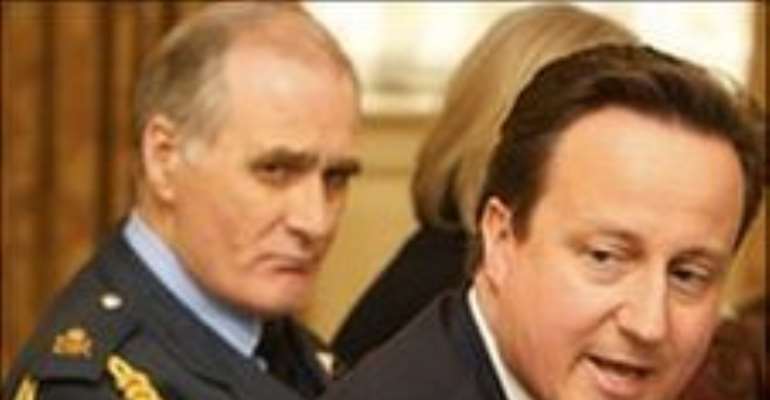ARMED FORCES CHIEF SIR JOCK STIRRUP TO QUIT EARLY

Britain's most senior military officer will quit in the autumn, before the end of his term in April 2011, Defence Secretary Liam Fox has said.
Air Chief Marshal Sir Jock Stirrup has been chief of the defence staff since 2006 and was asked to extend his term by the previous government.
Ministry of Defence civil servant Sir Bill Jeffrey will also go.
The BBC's Caroline Wyatt said the move would be seen as the new government's bid to draw a line under past failings.
Critics say Sir Jock, a former jet pilot, has not done enough to support Britain's front-line troops in his role as the head of the armed forces and the government's principal military adviser.
There have been accusations that a poorly-equipped British army has been fighting the Taliban in Afghanistan with too few troops.
There has also been criticism of excessive spending on MoD procurement.
Defence Secretary Liam Fox: “This was a very amicable discussion”
But Mr Fox said there had been an “amicable” discussion about “what was best for the department” and it would be wrong to suggest the two men had been fired.
“This is all about timing”, he said.
He told BBC One's Politics Show: “I really don't think, whatever mistakes were made in Afghanistan or anywhere else, that the blame should land anywhere else but firmly on the desks of politicians.
“They were the ones responsible. They were the ones ultimately who took the decisions and I rather think it's a bit cowardly for politicians to be blaming people who work for them rather than taking the decisions themselves.”
Similar sentiments were expressed by Foreign Secretary William Hague, who told BBC One's Andrew Marr Show there would be a “natural point” for a change of personnel in autumn, once the current strategic defence and security review was over.
Sir Jock Stirrup
Continue reading the main story http://news.bbc.co.uk/2/hi/politics/10303009.stm#skip_feature_02
Commissioned as an RAF pilot in 1970 and went on to fly Jaguar jets
Held a number of senior RAF posts, including director of Air Force plans and programmes
Chief of the air staff in 2003
Chief of the defence staff (CDS) in 2006
July 2009 – CDS role extended to April 2011
June 2010 – Emerges that he will quit six months early
It comes after Mr Fox told the Sunday Times he wanted the “best people to be in the appropriate posts” this autumn once the review was over.
Shadow defence secretary Bob Ainsworth, who worked with the outgoing pair when Labour were in government, paid tribute to the men, saying they “both played an incredibly important role at the Ministry of Defence in often very difficult circumstances”.
He said they always had his “full confidence” and added that he was pleased they would remain in place for the strategic defence and security review since “their skills and experience will be an invaluable contribution”.
Sir Jock is likely to be replaced by an Army man – either the chief of the general staff, Gen Sir David Richards, who commanded Nato forces in Afghanistan, or the vice-chief of the defence staff, Gen Sir Nicholas Houghton.
Foreign Secretary William Hague: “They are highly valued public servants”
Permanent Under Secretary Sir Bill Jeffrey has been in his post since 2005.
In a message to staff on Friday, he said his intention had been to depart last autumn, but he had been asked to stay on until after the election.
“The secretary of state has now said that he would like me to see through the defence interest in the SDSR (strategic defence and security review).
“I am very glad to do so, because, like others, I see the review as a real opportunity to set defence on a good course for the future,” he wrote.
“There will be an announcement in due course about the process for identifying my successor.”
Some 295 British service personnel have died in Afghanistan since military operations there began in 2001 in the wake of the 9/11 attacks in the US.
British troops joined a US-led coalition that invaded the country because the Taliban in Afghanistan were accused of providing a sanctuary for al-Qaeda leader Osama Bin Laden.
Since then, efforts to help the Afghan government maintain security across the country have met resistance from Taliban insurgents.
Last week was one of the worst for Nato forces in Afghanistan since the start of the war. Some 32 Nato troops, including three Britons, have been killed since last Sunday.
